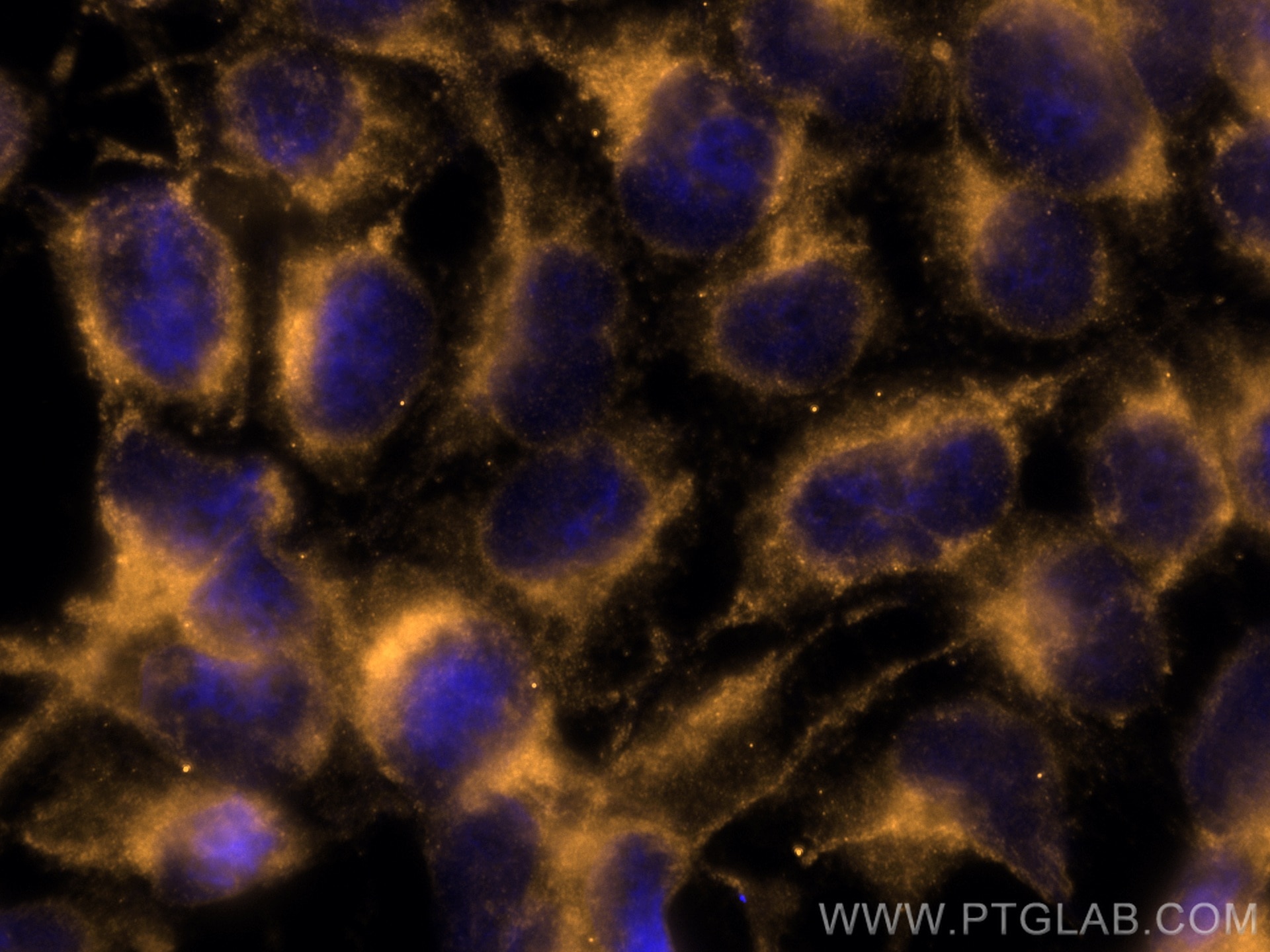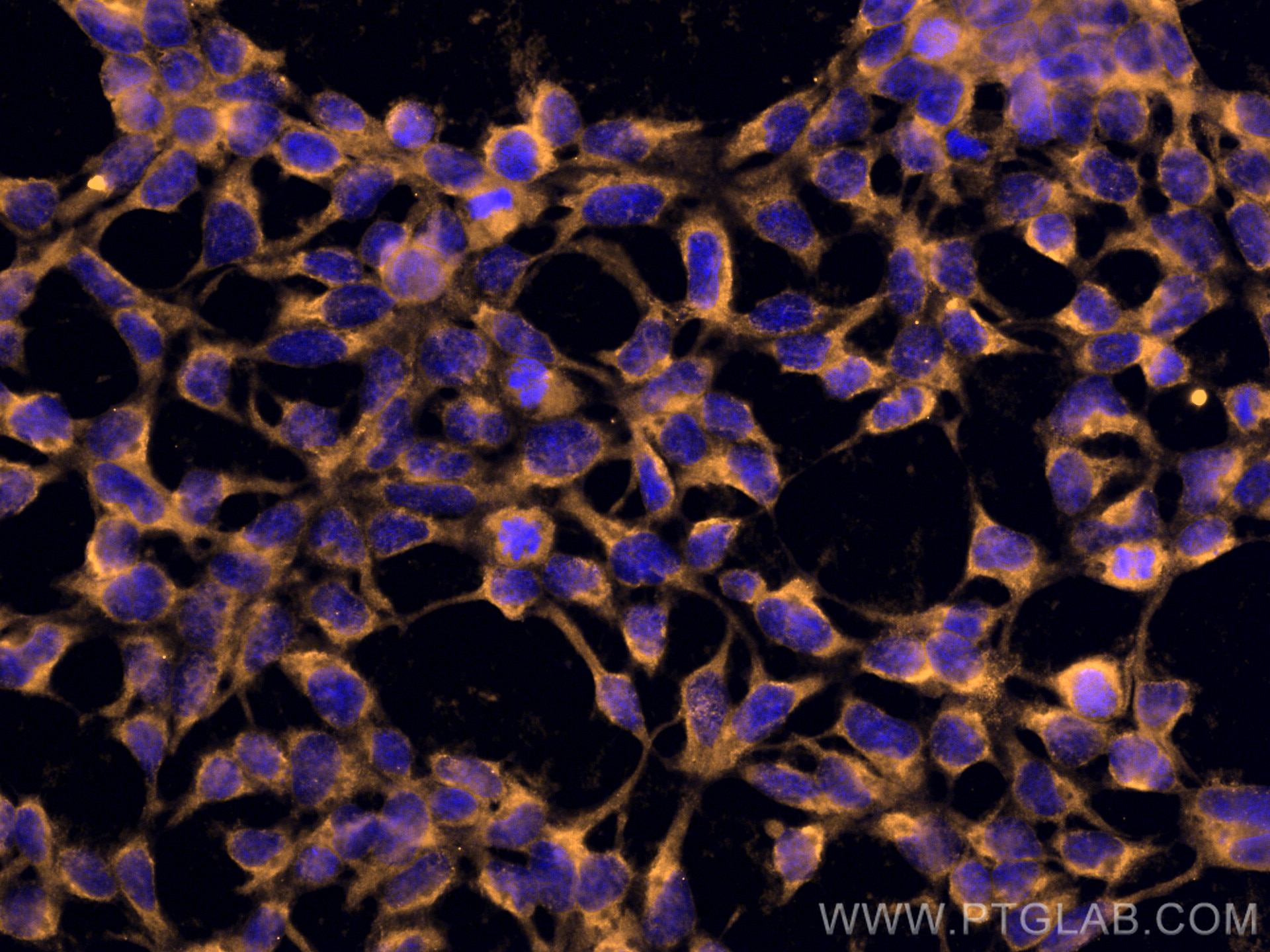Tested Applications
| Positive IF/ICC detected in | HEK-293 cells |
Recommended dilution
| Application | Dilution |
|---|---|
| Immunofluorescence (IF)/ICC | IF/ICC : 1:50-1:500 |
| It is recommended that this reagent should be titrated in each testing system to obtain optimal results. | |
| Sample-dependent, Check data in validation data gallery. | |
Product Information
CL555-67670 targets MTHFD1 in IF/ICC applications and shows reactivity with human, mouse, rat samples.
| Tested Reactivity | human, mouse, rat |
| Host / Isotype | Mouse / IgG1 |
| Class | Monoclonal |
| Type | Antibody |
| Immunogen |
CatNo: Ag24553 Product name: Recombinant human MTHFD1 protein Source: e coli.-derived, PET28a Tag: 6*His Domain: 536-935 aa of BC009806 Sequence: TNDRFLRKITIGQAPTEKGHTRTAQFDISVASEIMAVLALTTSLEDMRERLGKMVVASSKKGEPVSAEDLGVSGALTVLMKDAIKPNLMQTLEGTPVFVHAGPFANIAHGNSSIIADQIALKLVGPEGFVVTEAGFGADIGMEKFFNIKCRYSGLCPHVVVLVATVRALKMHGGGPTVTAGLPLPKAYIQENLELVEKGFSNLKKQIENARMFGIPVVVAVNAFKTDTESELDLISRLSREHGAFDAVKCTHWAEGGKGALALAQAVQRAAQAPSSFQLLYDLKLPVEDKIRIIAQKIYGADDIELLPEAQHKAEVYTKQGFGNLPICMAKTHLSLSHNPEQKGVPTGFILPIRDIRASVGAGFLYPLVGTMSTMPGLPTRPCFYDIDLDPETEQVNGLF Predict reactive species |
| Full Name | methylenetetrahydrofolate dehydrogenase (NADP+ dependent) 1, methenyltetrahydrofolate cyclohydrolase, formyltetrahydrofolate synthetase |
| Calculated Molecular Weight | 101 kDa |
| Observed Molecular Weight | 101 kDa |
| GenBank Accession Number | BC009806 |
| Gene Symbol | MTHFD1 |
| Gene ID (NCBI) | 4522 |
| RRID | AB_2934685 |
| Conjugate | CoraLite®555 Fluorescent Dye |
| Excitation/Emission Maxima Wavelengths | 557 nm / 570 nm |
| Form | Liquid |
| Purification Method | Protein G purification |
| UNIPROT ID | P11586 |
| Storage Buffer | PBS with 50% glycerol, 0.05% Proclin300, 0.5% BSA, pH 7.3. |
| Storage Conditions | Store at -20°C. Avoid exposure to light. Stable for one year after shipment. Aliquoting is unnecessary for -20oC storage. |
Background Information
MTHFD1 is a trifunctional enzyme involved in the pathway tetrahydrofolate interconversion, which is part of One-carbon metabolism. MTHFD1 is associated with HCC and CRC progression. It has been reported that MTHFD-deficient patient fibroblasts exhibit enriched MTHFD1 in the nucleus which is critical for de novo dTMP synthesis.(PMID: 31133746, 30997850, 31421459, 25548164)
Protocols
| Product Specific Protocols | |
|---|---|
| IF protocol for CL555 MTHFD1 antibody CL555-67670 | Download protocol |
| Standard Protocols | |
|---|---|
| Click here to view our Standard Protocols |






